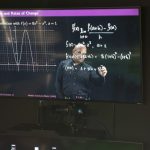Davidesco, an assistant professor in the Neag School of Education, is the recipient of an NSF Early Career Development (CAREER) Program award. This prestigious grant supports the research of early-career faculty who demonstrate remarkable potential to become leaders in their field. Additionally, the award seeks to support projects that actively engage students and the community.
What are phenomena and how can science teachers use these events to engage students in science? Professor of Science Education Todd Campbell joins us to help start a series about using phenemona in science education. Listen to hear about new strategies in how pre-service science educators are being prepared, where to start if you are beginning a journey to adopt NGSS, and how we can all use phenomena to help students explain the world around them.
“The visits to UConn are really important to the students taking UConn classes for credit in high school,” says Brendan Wilkosz ’03 (ED), ’04 M.Ed., who has been at Berlin HS since 2004, and teaches a chemistry class that grants UConn credit through the ECE program. “There can be a disconnect for the students if they are physically separated from UConn. This year, that was not possible, but it was important for me to do something, so we worked on a virtual day. There was a real willingness at UConn to get that done to have students experience the challenges and complexities of the work, but also see that the research is cutting edge.”
Through the help of Zaghi, Hain, Civil Engineering Professor Richard Christenson, Educational Psychology Professor Joseph Madaus, English Professor Tom Deans, and Literacy Education Professor Rachael Gabriel, the team will be developing a strength profiler tool, creating a peer mentoring program, piloting a technical writing program, and holding stakeholder workshops.
For Rachael Manzer, a doctoral candidate in the Neag School of Education, life-transformative education takes many forms. Manzer is a five-year volunteer of the UConn 4-H Program, a leader with the Granby 4-H Club, a member of the NASA Network of Astronaut Teachers (NEAT), and a candidate for commercial space flight through Teachers in Space, Inc. In 2019, Manzer received the UConn College of Agriculture, Health and Natural Resources (CAHNR) 4-H Leadership Award, and was recently selected as the 2021 Northeast 4-H Volunteer of the Year Award.
As the world of science, technology, engineering, and math (STEM) becomes increasingly computational, promoting students’ computational thinking is essential to prepare them for future STEM careers. Neag School of Education assistant professor of learning sciences, Ido Davidesco, has received a $1.4 million grant from the National Science Foundation (NSF) to develop a month-long computational thinking unit in high school biology classes.
In 2013, Neag School alumnus and current doctoral student Amit Savkar, also a UConn associate professor in residence of mathematics, began looking into the reasons why so many students were dropping out of or failing math classes early in their college career.
Savkar realized the placement exams students took for those courses did not account for the individual differences in knowledge gaps. In response, he developed a platform that would analyze the response of students’ incorrect answers to questions and provide students with adaptive instruction through targeted videos in the areas the program identified as knowledge gaps.
In 2013, Neag School alumnus and current educational psychology doctoral student Amit Savkar ’07 Ph.D., ’17 MA, also a UConn associate professor in residence of mathematics, began looking into the reasons why so many students were dropping out of or failing math classes early in their college career.
“As in STEM fields – STEM education continues to present as a strong job market,” says David Moss, an associate professor in the Neag School of Education. “In the STEM fields the market appears strong across the spectrum of education – that is, post-secondary technical trading, 4-year degree graduates, as well as those with advanced all, face way better than average job prospects.”
NFA faculty, along with students from the University of Connecticut’s Neag School of Education, guided the dual-session program meant to give sixth-, seventh- and eighth-graders a summer boost in STEM education and aspiring teachers a real-world classroom experience.


